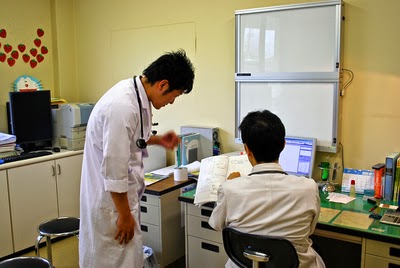China’s medical internship scheme starts in 2015 – but it comes at a price

From 2015, all Chinese medical students who wish to become a full doctor must complete a three year internship scheme at a hospital, the National Health and Family Planning Commission has announced.
The aim is to give all medical graduates in China a practical grounding in all clinical areas, and to achieve consistent standards for medical practitioners across China. The scheme will mean that once medical students have graduated they will obtain an internship at a hospital and do standardized training in various rotations such as surgery, psychiatry and paediatrics as well as receive additional training in areas such as communication with patients. During the three years the interns will have assessments and exams that they will have to pass to gain a license to be a full doctor.
The plan will bring China into line with most other countries that have medical internship systems, but Chinese medical students are not happy. They say the new internship scheme will add another three years to an already lengthy medical training – and will also mean three more years of penury. At present, the competitive education system means that most medical students have to complete a Masters or even a PhD in order to obtain a training place in a city hospital. This takes at least seven or eight years, so would-be doctors now face a training period of at least 10 years – or possibly 12 years – before they become a fully fledged doctor. And during this long period, students earn little or nothing.
Current internship schemes at Nanjing hospitals, for example, see interns earning about 2000 yuan a month – well below the average incomes of other students who have done masters or doctoral degrees. Students say the new internship scheme will mean that the total costs of studying to be a doctor will be at least 150,000 yuan.
“Undergraduate, masters, doctorate – at least eight years then three years more of training – that means you will be at least 30 before you are a doctor. What about marriage and having children?” said one medical student who predicted that the new system would turn many bright students away from studying medicine.
The internship plan will come into effect in all Chinese provinces from 2015 and the full standardised internship system must be up and running by 2020, the NHFPC says.
Intern scheme concerns
Internship scheme will create bottlenecks and headaches
Doctor training moves to a three-year internship system next year but many medics believe the changes will leave hospitals with even worse staffing shortages. The new system which will see newly-graduated doctors rotate through various hospital departments to gain experience is intended to bring China into line with other countries and to create a uniform high standard of medical practitioners.
However, critics warn that the additional three years of being a trainee will mean that doctors earn very little and the low income will deter many from entering the medical profession. Another drawback of the new system is that doctors will serve as interns in tertiary ‘teaching hospitals’ and will then refuse to be ‘downgraded’ to work in smaller local country and township hospitals.
Ban on telehealth consultations triggers backlash
There has been a major backlash against an announcement that doctors will be banned from conducting online consultations by the National Health and Family Planning Commissioning. The NHFPC said this week that ‘remote’ consultations are illegal except through accredited medical institutions because all doctor consultations need to be carried out according to the regulations of the NHFPC as currently laid down for hospitals and clinics. The NHFPC said remote consultations should be viewed as no different to any other kind of consultation and therefore all the usual regulations on medical practice apply. However, after a major backlash from health groups and online health providers such as www.haodf.com, the NHFPC said it would look again at the legislation and would ‘listen to the opinion of the masses’ in interpreting the legislation.
Rural health insurance not working
People who live in remote rural areas of China are so poor they cannot afford to seek medical attention when they are sick, a study from Hebei has found. More than 50% of people living in the Dabie mountain areas of Hebei said they would not seek medical care if they felt unwell. The main reason (for 38% of people) was financial difficulty. Other reasons included inconvenience and preference to self medicate. Researcher Dr Fang Pengqian and colleagues from the Tongji Medical College, Wuhan said the findings suggested that the universal health coverage from the New Cooperative Medical Scheme (NCMS) was was not working for people in poorer highland areas. They said the locals could not afford to pay the necessary insurance premiums to cover basic care and the low reimbursement meant they faced high out-of-pocket costs.







